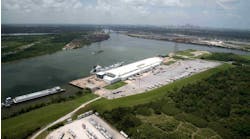RLS Logistics achieves BRC food safety certification
RLS Logistics recently received food safety certification through the British Retail Consortium Global Standard (BRCGS).
The cold chain solutions provider said it garnered the organization’s highest AA rating at its Newfield NJ, Vineland NJ and Salt Lake City UT cold storage facilities and for its distribution network.
BRCGS certification for storage and distribution is an internationally recognized accolade awarded to companies that meet BRC Standards of best practice for quality, hygiene and product safety.
BRC is one of the most highly regarded certification programs identified by the Global Food Safety Initiative (GFSI). To attain certification, each facility operated by RLS Logistics receives a third-party audit of everything from quality management and risk analysis to building standards and vehicle operations.
“As one of the most challenging certifications to earn, BRC aids client trust due to the reputation the program has,” said Jose Maldonado, director of quality and safety at RLS. “It holds your company accountable for adhering to best practices, not just in the U.S. but across the globe—and with the new audit protocol, it is a requirement to be ready at any moment because of unannounced audits.”
BRC awards certificate grades of AA (the best), A, B, C or D, depending on the number and type of nonconformities that the audit reveals. RLS earned the AA grade for its distribution network and its facilities in Newfield, NJ; Vineland, NJ; and Salt Lake, UT. Its Delanco NJ, Pittston PA and Scranton PA facilities are preparing for their audits this summer.
“Our commitment to food safety does not go unnoticed by customers. Protecting their brand is a top priority,” said John Gaudet, vice president of business development. “Our philosophy is always to be a leader in quality and with BRC being a top-sanctioned organization, we continue to be. BRC updates its standards regularly due to the everchanging climate, such as the pandemic—they allow virtual audits for facilities that limit outside visitors and now have mandatory impromptu audits.
“Their continuous updates oblige us to always adhere to the most current standards and remain a trusted 3PL in the industry.”
BRC released new standards for storage and distribution last fall. Included in the latest issue is mandatory unannounced audits every three years to ensure each facility upholds the regulations at any given time. Additionally, quality culture is part of the evaluation, which assesses the facility’s team member accountability to suggest improvements to the food safety programs. This ensures BRC standards always are top of mind for the facilities, and not only when the audit is upcoming.
“Upholding our certification is a team effort that we are very proud of,” Maldonado said. “Everyone here at RLS is committed to food safety, from top leadership cascading throughout every position in every business unit.”



